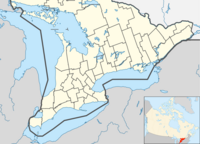Glen Williams, Ontario
|
Glen Williams Williamsburg (before 1852) |
|
|---|---|
| Unincorporated community | |

Main Street
|
|
| Nickname(s): The Glen | |
| Location of Glen Williams in Ontario | |
| Coordinates: 43°39′52″N 79°55′30″W / 43.66444°N 79.92500°WCoordinates: 43°39′52″N 79°55′30″W / 43.66444°N 79.92500°W | |
| Country |
|
| Province |
|
| Regional municipality | Halton |
| Town | Halton Hills |
| Settled | 1825 |
| Time zone | EST (UTC-5) |
| • Summer (DST) | EDT (UTC-4) |
| Forward sortation area | L7G |
| Area code(s) | 905 and 289 |
| NTS Map | 030M12 |
| GNBC Code | FBHWX |
Glen Williams is a hamlet in the Credit River valley in the province of Ontario, Canada. It is part of Halton Hills in the Halton Regional Municipality. Glen Williams is home to many visual artists, contains a collection of artist’s studios and is a major draw to the area. Glen Williams has a compact community core that includes commercial uses, a restaurant and bakery, a community centre (Town Hall), parks, churches and homes. The character of the hamlet of Glen Williams is largely defined by the heritage buildings, which help give Glen Williams its distinctive look and feel. These buildings help create an environment that is distinctive and lays the foundation for a cohesive community. The Credit River which flow through the village extends over 1500 km from the Niagara Escarpment, emptying into Lake Ontario at Port Credit, Mississauga. Glen Williams is also home to many species of birds, mammals and fish, with the river providing an exemplary habitat for them.
In the fall of 1824, a grant of 200 acres in the township of Esquesing was made by the crown to John Butler Muirhead, a barrister in the town of Niagara. Muirhead died later that year, and was buried in the Butler burying-ground outside of Niagara-on-the-Lake. He seemed to have known that the end was approaching, for shortly before his death he wrote a will, devising the land to James Muirhead and Thomas Butler. About a year later, on November 9, 1825, the devisees of the will sold the land for £100 to Benajah Williams (1765-1851).
Benajah was then in his sixty-first year. He had been born in the colony of New York, whence his father Roger had emigrated from Wales. But during the rebellion, the family supported the loyalist cause, and by 1786 Benajah had joined the trek to the crown's new colony of Upper Canada. For a number of years he worked at Mr. Burch's mills in the Niagara district, before settling eventually in Gainsboro township, where the town of Stamford grew up. There his third wife, Elizabeth (1797-1851) bore some of his fifteen children, many of whom would live in the Glen: Joel (1806-1871), Lydia (1809 1871), Charles (1811-1889), George (1813-1836), Jacob (1816-1853), Ira (1818-1833), Isaac (1820-1911), Anna, Israel, David, and Ezra.
...
Wikipedia



